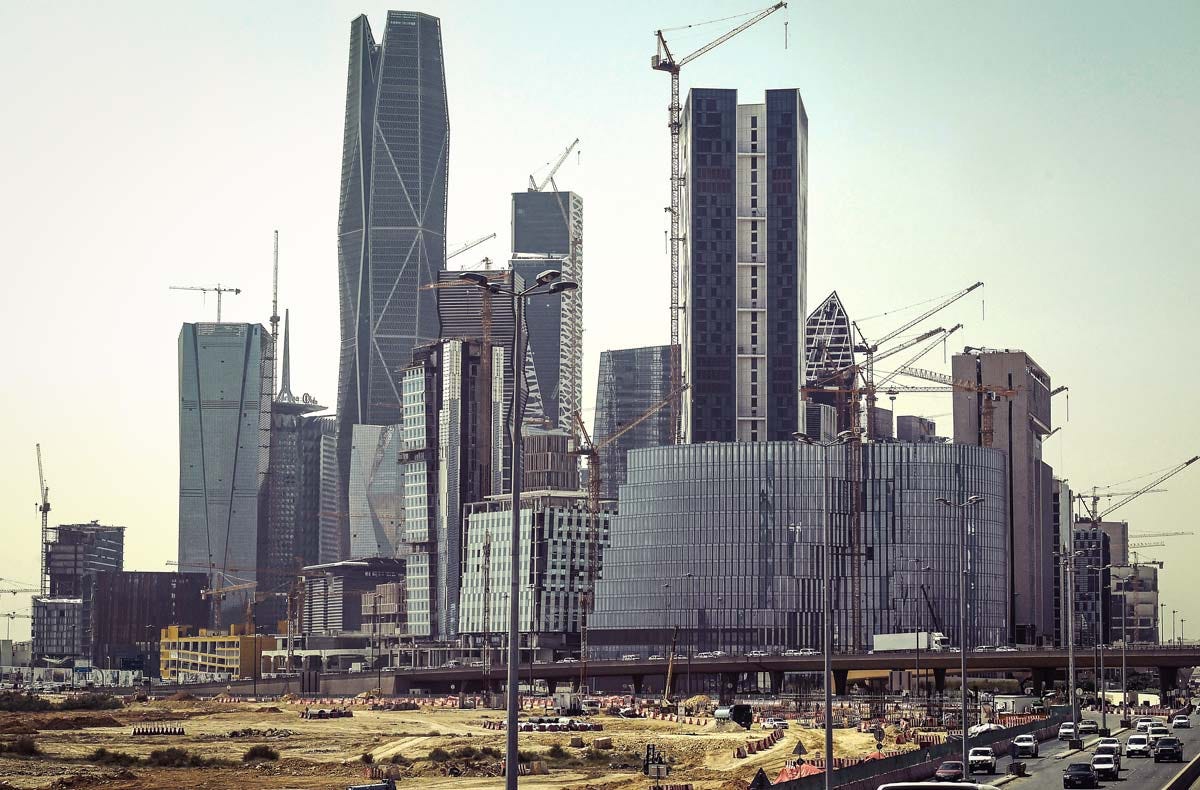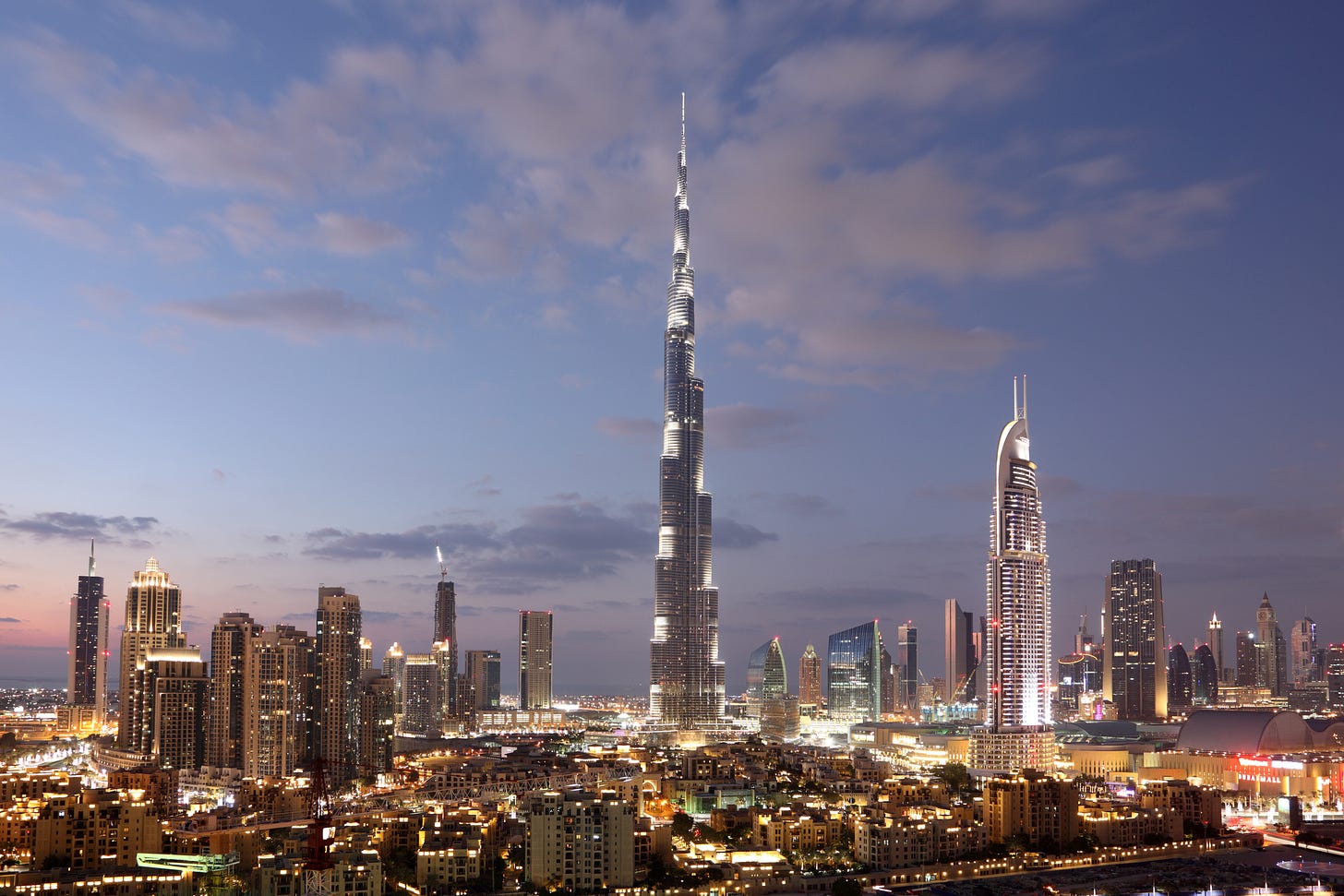Emerging Markets Monitor - Sept. 7
Saudi Arabia's Construction Boom, Chile Adds More Centrists to Cabinet, Dubai Office Rents Soar, Pakistan's Flood Misery, Japan-ification of China? + India Roads Safety
The Top 5 Stories Shaping Emerging Markets from Global Media - September 7
With $1.1 Trillion in Investment, Saudi Arabia Makes Construction History
Arab News
“Following the launch of Saudi Arabia’s Vision 2030 in 2016, the Kingdom is on its way to becoming the world’s biggest construction site with a total investment of SR4.13 trillion ($1.1 trillion) in infrastructure and real estate projects, according to global real estate consultancy Knight Frank.”
“The real estate firm projected that Riyadh’s population will reach 17 million by 2030, up from about 7.5 million today. The city has unveiled real estate projects worth $104 billion since the Kingdom’s National Transformation Plan launch in 2016.”
“‘Vision 2030 has lit the embers of excitement across the Kingdom, and with NEOM positioned as a crown jewel in the transformative plans, people are eager to be part of history,’ Faisal Durrani, partner and head of Middle East research, Knight Frank told Arab News.”
“Saudi Arabia will easily become the largest construction site in history, with planned construction projects in the Kingdom being over 555,000 residential units, over 275,000 hotel keys, over 4.3 million square meters of retail space, and over 6.1 million square meters of office space, Durrani said.”
“The consultancy firm is currently monitoring 15 giga-projects in the Kingdom, many of them new standalone supercities, said Harmen de Jong, partner and head of real estate, Strategy& Consulting in the Kingdom.” Arab News reports.
Chile Adds More Centrists to Cabinet After Constitution Overhaul Rejected
Wall Street Journal
“Chilean President Gabriel Boric appointed more centrist cabinet ministers Tuesday after voters overwhelmingly rejected a new constitution that would have constrained the country’s market-based economy and led to other changes long sought by his political base.”
“With students angry about the outcome of the referendum on the constitution demonstrating near the doorstep of the presidential palace, Mr. Boric gave a speech in which he said that replacing the cabinet was imperative to reflecting the message that Chilean voters delivered Sunday. In a lopsided vote that polls hadn’t predicted, 62% of voters opposed a proposed constitution drafted by a constituent assembly largely made up of leftist activists.”
“The draft constitution would have expanded the rights of indigenous people, enshrined abortion rights and guaranteed rights to housing, education, pensions and many other services. Some constitutional analysts said the draft charter would have undermined the balance of power, weakened the independence of the judiciary and scaled back equality for all citizens under the law.”
“Mr. Boric’s new cabinet tries to address some of those concerns as he and members of Congress set the stage for starting a new process leading to a new constitution, which Chileans said they overwhelmingly wanted in a 2020 referendum. The new cabinet members would help facilitate the negotiations with rival political parties that need to take place ahead of an election for a new assembly that would draw up a new charter.” WSJ reports.
Dubai Office Rents Rising Faster Than New York or London
Bloomberg
“Office rents in Dubai are rebounding for the first time in six years, rising faster than in New York or London as global banks and businesses expand into the financial hub known for its love of glitzy construction.”
“The rush for office space in the emirate is on show in skyscrapers like ICD Brookfield Place, which towers 800 feet (244 meters) over the financial district. The tower opened just as the pandemic spread globally, but roughly 90% of its 1.1 million square feet of office and retail space is now taken or under offer, with a long wait list for the rest.”
“Tenants include UBS Group AG, Israeli fintech firm Rapyd and Pernod Ricard SA, which relocated staff from Hong Kong.”
“Demand for space in the skyscraper and across Dubai is surging as the emirate attracts more wealth and expats due to its nimble response to the pandemic and relatively easy access to visas. A growing clutch of firms are expanding in the sun-splashed business hub in favor of markets like Hong Kong and Russia, while workers are returning to offices at a particularly high rate.” Zainab Fattah reports.
A Super-Flood Piles Misery on Pakistan. ‘There Could be Food Riots.’
Financial Times
“Pakistan’s prime minister Shehbaz Sharif has warned of a ‘humongous challenge’ ahead following catastrophic floods in the country that have coincided with an acute financial crisis and a deepening political conflict between the government and former leader Imran Khan.”
“‘…This natural disaster, this calamity, should elicit an international response — which it has not elicited so far,’ said Shahnaz Wazir Ali, a former MP and minister of social welfare. ‘If there isn’t a reasonably substantial rescue programme, then it will be a complete disaster,’ she added. ‘There could be food riots, instability.’” The FT reports.
Is China Headed for Stagnation as Property Markets Goes the Way of Japan?
South China Morning Post
“China’s real estate assets are facing the risk of a protracted pricing decline, if Japan’s experience in dealing with its own property bubble and more than two decades of economic stagnation are anything to go by, analysts said.”
“The spectre of a real estate crisis blowing up to become a full economic crisis in the world’s second-largest economy looms large, as household consumption and investment are likely to take a severe blow and the fiscal resources of the government are also limited because the funding crunch in the property segment also impacts land sales, a major source of revenue, according to Natixis Corporate and Investment Banking.”
“‘It does look a little bit worrisome,’ said Alicia Garcia Herrero, chief Asia-Pacific economist with the French investment bank. “It’s well known that if you have very low prices, that feeds asset price inflation. It happened in Japan and it’s what can happen in China, given that China has been undergoing deflationary pressures for so many reasons. One is ageing, the other is the idea of bursting of the bubble. For me, it looks like asset prices will need to correct structurally, but especially real estate prices.” Cheryl Arcibal reports.
Plus…
Cyrus Mistry Death Revives Concerns About India’s Road Safety
Quartz
“The death of Cyrus Mistry, one of India’s best-known business leaders, has revived a conversation around Indian roads, which are among the least safe in the world.”
“In 2021, India witnessed an average of 18 deaths per hour due to road accidents, according to the National Crime Records Bureau. The data further highlights that public transport is safer than private modes of conveyance.”
“Speeding and negligent driving are the most common reasons for fatal car rides in India, and there’s low awareness around seatbelts. Just this past February, the Indian government made three-point seat belts mandatory for all cars with front-facing passenger seats. But much more is needed for a country that has just 1% of the world’s vehicles, yet about 10% of all crash-related deaths.” Quartz reports.
"Oh threats of Hell and Hopes of Paradise!
One thing at least is certain - This Life flies;
One thing is certain and the rest is Lies -
The Flower that once has blown forever dies."
— Omar Khayyám (Rubáiyát of Omar Khayyám)





